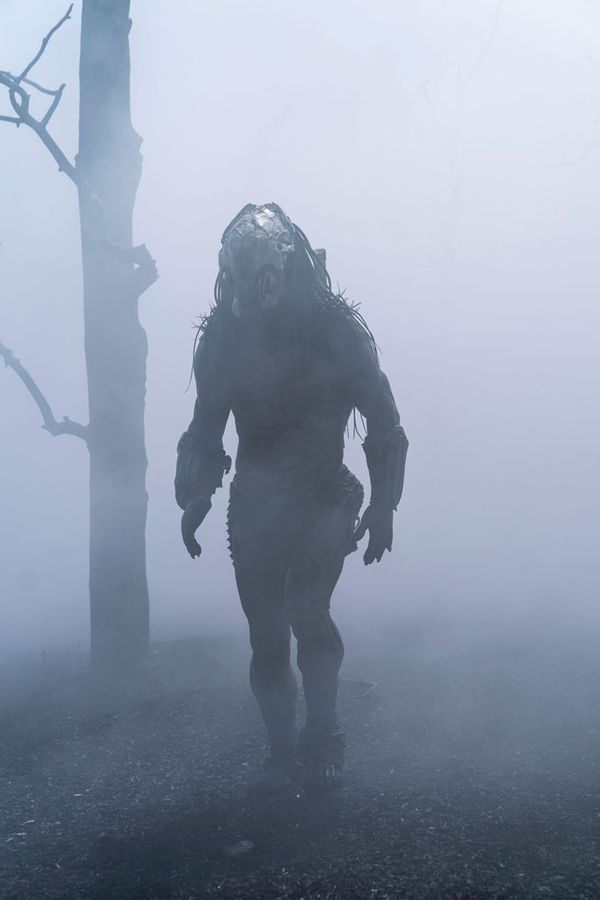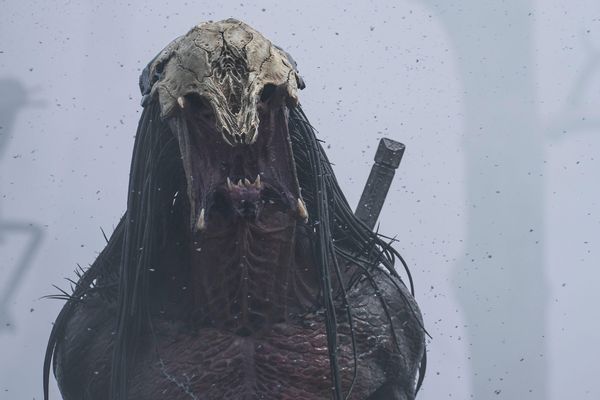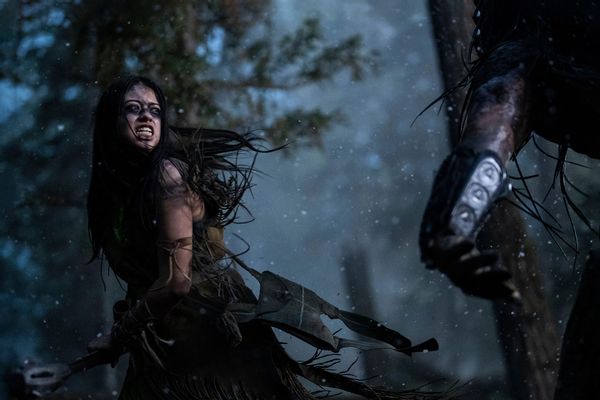“Everyone can and should get our own ‘Predator,'” says writer who’s watched film 146 times
I forgot to ask Ander Monson an important question.
Days after our interview, when I text him a follow-up posed by a colleague of mine: Why do you think several actors from “Predator” (Jesse Ventura, Arnold Schwarzenegger) have become governors? he writes back right away. “Because they were/are our surrogate dads.”
It’s the kind of smart and quick response readers have come to expect from Monson, author of nine books, including the short story collection “The Gnome Stories” and the essay collection “I Will Take the Answer.” And the speedy, definite answer makes sense given Monson has watched the film “Predator,” by his estimation, 146 times.
Monson is perhaps best known as an essayist, though his back catalogue includes poetry and a novel-in-stories, his work distinguished by his sharp, inventive excavation of form. But with his new book, he turns for the first time to memoir. And he turns back to “Predator,” the 1987 action movie that he credits, in part, with helping him through a difficult childhood, marked by the death of his mother. He returned to “Predator” when Gabrielle Giffords, the Representative from his state, Arizona, was shot in the head during an attempted assassination attempt in 2011.
As a method of “coping with grief and rage,” Monson says he lost himself in playing violent video games and replaying “Predator,” which stars Arnold Schwarzenegger as the head of a paramilitary rescue team, trying to save hostages in a rainforest in Central America, who encounter an alien hunter known as the Predator.
“At some point I was just killing a marauder with an assault rifle and I’m like, ‘What am I doing? What is this in me, that this is what constitutes self-care?’ And that got me to, ‘OK, what have I learned? What are the things that I absorbed as a kid, watching these action movies?’ Hundreds and hundreds of hours of these action movies, and I didn’t think about them.”
He started to think about them, and think closely about boyhood, masculinity and America. The book that came from that exploration “Predator: A Memoir, a Movie, an Obsession” is now out from Graywolf Press, mere weeks after the latest film in the “Predator” saga, the prequel “Prey,” premiered at No. 1 on Hulu.
Salon talked to Monson about “Predator,” “Prey” and his new book.
This interview has been edited for length and clarity.
How would you describe this book? Sorry, I was trying to start with an easy one, but I guess that’s a hard one.
I’m trying to use myself as an instrument through which to watch “Predator,” one of the most influential, if not the most influential, if not the best American movie ever made. It’s a really crucial American movie of the ’80s. It is the best of that kind of hyper-masculine, fairly homoerotic action, big men jungle-ling around kind of movie. And it’s one that deeply wounded me, as well as deeply parented me as a kid, as an adult, and as a teenager . . . The book is a way of me rewatching these movies and trying to figure out what the hell I watched and how much of America is represented . . . So much of the culture that the movie gives rise to just appears in it. And then also, why did the gay poet Paul Monette write the novelization for the movie? What did he see in this “dumb blockbuster” that I didn’t as a 12-year-old? And it turns out there’s a lot.
You have a lot of books in different formats, but you’ve never done a memoir before. Why did you decide to write a memoir now or a memoir for this story?
I’ve put a whole book out that’s explicitly not a memoir. “Vanishing Point” is a bit of a broadside against memoirs and against the reliance on memoir. I discovered pretty late in the process that was what I was doing. If you want to write about a thing, what you’re always writing about is you experiencing the thing. That’s the only honest way to do it.
“I’ve kind of moved off that stance that I had, which is, ‘I don’t know if we should be writing so many memoirs.’ And now I’m like, ‘Maybe we should all be writing memoirs.'”
I can’t watch “Predator” as Ali Stine. I could only watch “Predator” as Ander Monson. And to watch “Predator” as Ander Monson, there’s a lot of history and I wanted to be honest about the instrument . . . I wrote three totally different drafts of this book and only in the last one I happened on the narrative structure, which is: we’re just going to watch the movie shot by shot, moving through it. But you and I are going to watch the movie, and so I’m the lamp that the reader lights with its presence when you are in the book.
 The Predator (Dane DiLiegro) in “Prey” (David Bukach/20th Century Studios)
The Predator (Dane DiLiegro) in “Prey” (David Bukach/20th Century Studios)
I felt it had to be a memoir . . . There’s a quote from Patricia Hampl I really love: “The self is not the subject of memoir, it is the instrument of memoir.” . . . After writing that book about memoir, kind of taking some shots at memoir, I came to regret my position. I think it was a gendered, sexist position because, as you know, a lot of criticism is leveled against memoirs being a “women’s genre” or whatever. And I’m probably guilty of that in that book, a certain kind of snobbery, and a certain kind of just not willing to accept that the self is a suitable or interesting enough or sharp instrument to see through a thing. Never mind that you’re always seeing through the self. I mean, you can’t not . . . I’ve kind of moved off that stance that I had, which is, “I don’t know if we should be writing so many memoirs.” And now I’m like, “Maybe we should all be writing memoirs.”
You mentioned a lot of criticism about memoir, specifically about women writing it. There’s also a lot of criticism out there about women’s trauma memoirs and violence memoirs in general. And I’ve never made that connection, but in a way this book could be seen as a kind of a trauma memoir. Because you are writing about your trauma, and also national trauma and violence, national violence.
A hundred percent. I can’t speak for men. I mean, I don’t know if I’d want to speak for men, but I just don’t know how to speak for men. But I can speak for me, and my kind of relationship with men, and with being a man, being seen as one. Then seeing men storm the Capitol, who probably are a bunch of “Predator” lovers like I am. A lot of them were men my age; they like to watch s**t blow up too.
I guess I wouldn’t call it a trauma memoir, but it is a memoir about being both traumatized and thrilled by this movie that I love so much, but also that wounded me. And [wounded] a lot of other people my age, all these other dudes. I’m not the only one who this kind of f**ked up and thrilled.
That was a part of the book that really surprised me. You mentioned the Capitol riots and the men that looked like the men in these action movies storming the U.S. Capitol.
Yeah, wearing the gear in the action movies.
You talk in the book about masculinity and what it means now, versus maybe when you were a kid and getting these ideas formed.
John McTiernan, the director, he makes a comment about how these movies are basically made for 13-year-olds. Although a lot of them are R-rated, and I mean, wink wink, 13-year-olds shouldn’t watch them.
But they have that level of adolescent glee to them, certainly. And that’s when I watched it. I was 13, maybe 12, I’m not quite sure, about right in there. At that age, you’re trying to wear aspects of masculinity . . . you’re trying to wear that as a kind of armor. You’re trying it out as a tool, a kind of weapon. You’re saying s**** to your friends that you, that I, shouldn’t have been saying, in retrospect. But everyone does. You’re cruel to your friends; you’re using language imperfectly to wound oftentimes.
 The Predator (Dane DiLiegro) in “Prey” (David Bukach/Hulu)And I watched all of these action movies. So many of them . . . that’s just a lot of content to have consumed unthinkingly. I had thoughts about them and I knew most of them were pretty bad. Some were really misogynist and offensive. And some were just f**ked up in ways, I don’t want to revisit them now. But then you can rewatch one of them at least and see all the layers in it. “Predator” is the best of them and the one that has the most in it. It’s just a beautiful movie to watch.
The Predator (Dane DiLiegro) in “Prey” (David Bukach/Hulu)And I watched all of these action movies. So many of them . . . that’s just a lot of content to have consumed unthinkingly. I had thoughts about them and I knew most of them were pretty bad. Some were really misogynist and offensive. And some were just f**ked up in ways, I don’t want to revisit them now. But then you can rewatch one of them at least and see all the layers in it. “Predator” is the best of them and the one that has the most in it. It’s just a beautiful movie to watch.
What do you think a legacy of “Predator” might be?
I’ve been thinking a lot about this, and I think that “Prey” changed my mind.
 Naru (Amber Midthunder) in “Prey” (David Bukach/20th Century Studios)
Naru (Amber Midthunder) in “Prey” (David Bukach/20th Century Studios)
To me, the “Predator” franchise has always been about masculinity. But that’s because the first one is. That is its primary subject. “Prey” is just a really good movie; I thought they did a great job with that movie, and it just takes [masculinity] completely out of it. [In “Predator] the thing that saves Dutch (Schwarzenegger) is, I don’t know if it’s masculinity, it’s like ingenuity. His willingness to improvise and think, and that’s what saves humanity . . . And when you think about it, I mean “Predator” is satirizing that. All we got is these big dudes hulking through the jungle. They’re impossibly beautiful, they’re impossibly ripped, they’re impossibly strong, they’re impossibly taciturn, and they all just get killed. Except Dutch.
Dutch is the one who survives. They have the best weapons. Doesn’t matter. “Predator” is an anti-colonial film. It is showing the folly of everything that we have done as Americans and as humans and as men. And the Predator just takes us apart until Dutch is able to do a little thinking, and then he barely gets out. All the rest, the whole team dies. And that’s basically what happens with the other movies too.
But the thing that hadn’t really occurred to me until fairly recently: “Predator” has a huge fan community, major cosplay community. There are a lot of people who like making the suits and making the masks, but no one wants to dress up as any of the humans. No one cares at all about the humans. I mean, we love Blain and we love Mac. We love the characters, but you don’t want to dress up as them because that’s not fun.
So to me the legacy of all the movies is the ability to see humanity, also masculinity, from outside of ourselves . . . As a 12-year-old I’m seeing these guys my dad’s age; they were my dad’s age then — I guess they still basically are — and then you are watching them, the kind of pointlessness of their endeavors, and their dirty jokes, and the way that they try to relate to each other. And they get killed anyway.
“It’s hard to see outside yourself. But ‘Predator’ gave it to me, for the first time, on the big screen.“
The Predator’s trying to understand. It tries to understand the Shane Black’s p**** joke or whatever, which is a bad joke, but it’s trying to figure it out. And then it mocks the laughter, it echoes the laughter of Billy. I could see that from outside myself, which is also just a really useful position as someone who grew up a cis white, straight male in a time of great privilege for that kind of person. It’s hard to see outside yourself. But “Predator” gave it to me, for the first time, on the big screen.
Everyone wants to play as the Predator. All the games, you want to play as the Predator. I mean, you might want to try to fight the Predator sometimes. But that is the real promise of the movie, and one that “Prey” opens up a little more explicitly to people that aren’t white straight cis men. And that’s why it’s so cool.
 Naru (Amber Midthunder) and the Predator (Dane DiLiegro) in “Prey” (David Bukach/Hulu)How would you try to reach someone who’s never watched “Predator” before? What would your speech be to try to get them to watch the movie?
Naru (Amber Midthunder) and the Predator (Dane DiLiegro) in “Prey” (David Bukach/Hulu)How would you try to reach someone who’s never watched “Predator” before? What would your speech be to try to get them to watch the movie?
I’m teaching undergrads, and most of them have not seen “Predator,” of course. Why would they? It’s an oldie to them. I think there are a couple of reasons [to watch]. One is that it’s a really beautiful movie. . . . The cool thing about action movies is you don’t really have to care that much about the dialogue or even the acting. The action is the thing that brings us pleasure and gives rise to our catharsis that we’re looking for.
“They think of it as theirs. And it is theirs, but it’s also mine and also yours. And to watch it is to make it our own.”
But “Predator” is the best of them because it also has real characters . . . Mostly they’re just kind of cardboard cutouts of dudes. Here’s the Hispanic guy, and here’s the white guy, and here’s the Black guy, and here’s the girl. And this one doesn’t. Everyone feels really lived in, which I think is really an accomplishment in a movie . . . And it gives you, I don’t know if it’s the first movie [but it] gives you the Predator POV. This was the first time I’d ever seen that. To see that we are outside of the ourselves loop; we get to be something else. It just opens up the movies to become so much more dimensional, frankly, than any of the other ones are. I mean, “Predator 2” is good, “Prey” is very good. But “Predator” is still the one I think has the most space to inhabit.
Want a daily wrap-up of all the news and commentary Salon has to offer? Subscribe to our morning newsletter, Crash Course.
And if you want to understand America, if you want to understand the situation we’re in with American masculinity, especially guys of a certain age on the internet, this is a movie that will show you the good parts and the bad parts. My book tries to do that for sure. I’ll be surprised if some of the internet fanboy culture doesn’t get mad about me trying to explain that there’s more in “Predator” that they might want to allow.
Because they think of it as theirs. And it is theirs, but it’s also mine and also yours. And to watch it is to make it our own. So, everyone can and should get our own “Predator.”
Read more
about the “Predator” franchise


